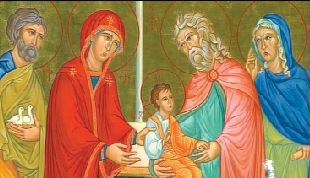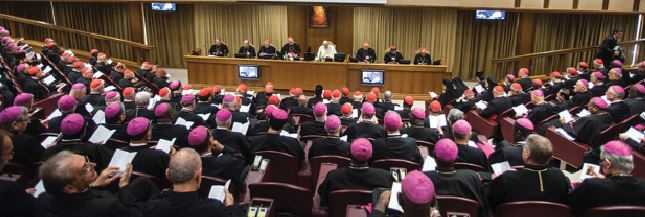 A first Synod (an assembly of bishops from around the world) on the family was held in Vatican City on October 5-19, 2014. We say “first” because a second Synod, also on the family, will also be held in Vatican City on October 4-25, 2015. Why two Synods? This is because the theme of the family is huge and extremely important, not only for the future of the Church, but for all mankind. It also means that we should not panic over what some media reported about the first Synod, since the final decisions will be taken by the Pope only after the end of the second Synod in 2015.
A first Synod (an assembly of bishops from around the world) on the family was held in Vatican City on October 5-19, 2014. We say “first” because a second Synod, also on the family, will also be held in Vatican City on October 4-25, 2015. Why two Synods? This is because the theme of the family is huge and extremely important, not only for the future of the Church, but for all mankind. It also means that we should not panic over what some media reported about the first Synod, since the final decisions will be taken by the Pope only after the end of the second Synod in 2015.
The theme of the first Synod was “The pastoral challenges to the family in the context of evangelization,” and its task was to examine the difficulties and sufferings of today’s families (for example, the fact that almost one marriage out of two ends in a divorce.) This Synod was called “extraordinary” because it brought together the presidents of all the episcopal conferences in the world (114 episcopal conferences in total) plus some experts invited by the Pope. The theme of the next Synod in October, 2015 is “The vocation and mission of the family in the Church and in the contemporary world”. It will be an “ordinary” Synod, made up of representatives of all the episcopal conferences in the world, and it will study the final report (guidelines, or conclusions) of the first Synod.
What caused much ink (and saliva) to flow, even a worldwide media shockwave, was the release of the midterm report of the Synod on October 13, which was supposed to summarize what the various participants in the synod said during the first week. The report was released to journalists even before the Bishops had seen it, and said that the Church had made a complete about face and was now accepting divorced and remarried Catholics, cohabitating couples and same-sex unions, which was obviously not true. As Cardinal Napier of South Africa said: “The message has gone out, ‘this is what the synod is saying,’ and it’s not what we are saying at all... Whatever we say hereafter is going to be as if we’re doing some damage control...”
Not surprisingly, a majority of Bishops complained about this report, and the next day, 470 amendments were presented, and the controversial paragraphs of the midterm report were finally eliminated or greatly modified, in order to correspond more faithfully to the traditional teaching of the Church. It is this corrected final report that will be sent to the bishops’ conferences around the world as a preparatory document for the Synod of 2015.
So there was obviously some confusion after the publication of this midterm report in the media, and several bishops said that only the Pope could end this ambiguity. Pope Francis indeed addressed the bishops at the end of the Synod, on October 18, and his message was very clear: the doctrine of the Church on marriage and the family will not change, but we must consider mercy. For example, Jesus not only said to the adulterous woman: “Neither do I condemn you”; he also added: “Go and sin no more.” (John 8, 11.)

Jesus did not neglect the doctrine, but he was also merciful. In other words, he did not separate charity from truth. In order to be merciful, one does not have to ignore the doctrine or put it aside either. Jesus did not come to abolish the law (the doctrine), but to fulfill it, adding a spirit of love. It’s a problem that some people have with the teachings of the Church: they see in it only a set of rules and things forbidden, without seeing the love of God behind them.
Here are excerpts from Pope Francis’ address at the conclusion of the Synod, in which he identified five temptations the Bishops faced during this Synod:
“One, a temptation to hostile inflexibility, that is, wanting to close oneself within the written word, (the letter) and not allowing oneself to be surprised by God, by the God of surprises, (the Spirit); within the law, within the certitude of what we know, and not of what we still need to learn and to achieve. From the time of Christ, it is the temptation of the zealous, of the scrupulous, of the solicitous and of the so-called today traditionalists and also of the intellectuals.
“Two, the temptation to a destructive tendency to goodness (in Italian, buonismo) that, in the name of a deceptive mercy, binds the wounds without first curing them and treating them; that treats the symptoms and not the causes and the roots. It is the temptation of the do-gooders, of the fearful, and also of the so-called progressives and liberals.
“Three, the temptation to transform stones into bread to break the long, heavy, and painful fast (cf. Lk 4:1-4); and also to transform the bread into a stone and cast it against the sinners, the weak, and the sick (cf Jn 8:7), that is, to transform it into unbearable burdens (Lk 11:46).
“Four, the temptation to come down off the Cross to please the people, and not stay there, in order to fulfil the will of the Father; to bow down to a worldly spirit instead of purifying it and bending it to the Spirit of God.
“Five, the temptation to neglect the depositum fidei [the deposit of faith], not thinking of themselves as guardians but as owners or masters [of it]; or, on the other hand, the temptation to neglect reality, making use of meticulous language and a language of smoothing to say so many things and to say nothing! (...)
“Dear brothers and sisters, the temptations must not frighten or disconcert us, or even discourage us, because no disciple is greater than his master; so if Jesus Himself was tempted and even called Beelzebul (cf. Mt 12:24) His disciples should not expect better treatment.
“Personally I would be very worried and saddened if it were not for these temptations and these animated discussions; this movement of the spirits, as St. Ignatius called it, if all were in a state of agreement, or silent in a false and quietist peace. Instead, I have seen and I have heard with joy and appreciation speeches and interventions full of faith, of pastoral and doctrinal zeal, of wisdom, of frankness and of courage.
“And I have felt that what was set before our eyes was the good of the Church, of families, and the supreme law, the good of souls (cf. Canon Law 1752). And this always we have said it here, in this hall without ever putting into question the fundamental truths of the sacrament of marriage: the indissolubility, the unity, the faithfulness, the fruitfulness, that openness to life.
“And this is the Church, the vineyard of the Lord, the fertile Mother and the caring Teacher, who is not afraid to roll up her sleeves to pour oil and wine on peoples wounds; who doesn’t see humanity as a house of glass to judge or to categorize people. This is the Church, One, Holy, Catholic, Apostolic, and composed of sinners, needful of God’s mercy. This is the Church, the true bride of Christ, who seeks to be faithful to her spouse and to His doctrine. It is the Church that is not afraid to eat and drink with prostitutes and publicans. The Church that has the doors wide open to receive the needy, the penitent, and not only the just or those who believe they are perfect! The Church that is not ashamed of the fallen brother and pretends not to see him, but on the contrary feels involved and almost obliged to lift him up and to encourage him to take up the journey again and accompany him toward a definitive encounter with her Spouse, in the heavenly Jerusalem. (...)
“Many commentators, or people who talk, have imagined that they see a disputatious Church where one part is against the other, doubting even the Holy Spirit, the true promoter and guarantor of the unity and harmony of the Church, the Holy Spirit who throughout history has always guided the barque, through her Ministers, even when the sea was rough and choppy, and the ministers unfaithful and sinners.
“And, as I have dared to tell you, as I told you from the beginning of the Synod, it was necessary to live through all this with tranquillity, and with interior peace, so that the Synod would take place cum Petro and sub Petro (with Peter and under Peter), and the presence of the Pope is the guarantee of it all. (...)
“Dear brothers and sisters, now we still have one year to mature, with true spiritual discernment, the proposed ideas and to find concrete solutions to so many difficulties and innumerable challenges that families must confront; to give answers to the many discouragements that surround and suffocate families. (...)
“May the Lord accompany us and guide us in this journey for the glory of His Name, with the intercession of the Blessed Virgin Mary and of Saint Joseph. And please, do not forget to pray for me! Thank you!”
And we, at MICHAEL, add: Let’s continue to pray so that the Holy Spirit may illuminate our Bishops and all the participants in the next Synod, for the greater good of all families.